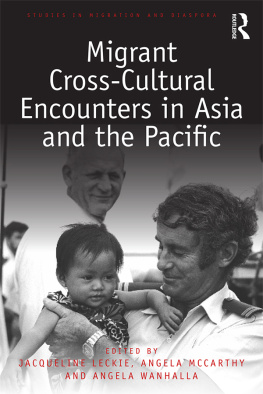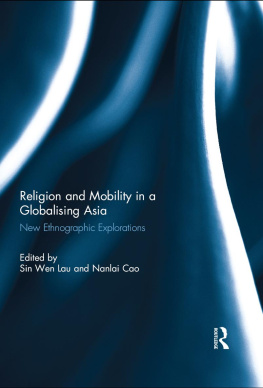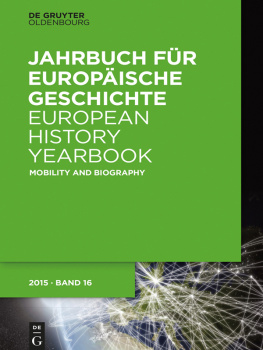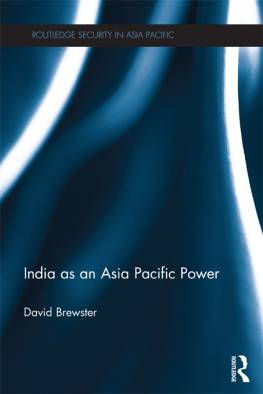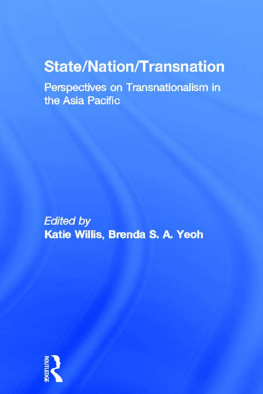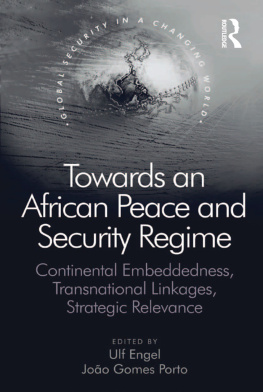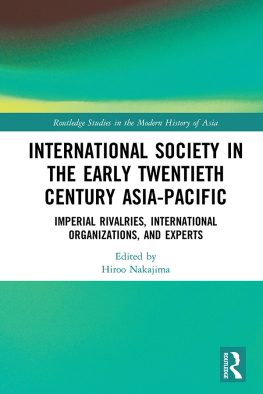The Asia-Pacific in the Age of
Transnational Mobility
Anthem Southeast Asian Studies
In tandem with its increasing strategic and market importance amidst the dramatic growth of the neighbouring economies of both China and India, Southeast Asias own political, social and intellectual trajectories have challenged not only the expectations of policymakers and analysts alike, but also raised important new questions for academia. Not surprisingly, recent years have seen a dramatic growth in scholarship devoted to the region. The Anthem Southeast Asian Studies series is committed to offering a global audience the best of this new generation of original scholarship drawn from across the full range of academic disciplines in the humanities and social sciences. Uniformly subject to rigorous editorial and production standards, our books are directed to academic libraries as well as to researchers, university students and other sophisticated audiences.
Series Editor
Michael W. Charney School of Oriental and African Studies, University of London, UK
Editorial Board
Barbara Andaya University of Hawaii, USA
Anne Booth School of Oriental and African Studies, University of London, UK
Elizabeth Collins Ohio University, USA
Kate Crosby Kings College London, UK
Christopher Goscha Universit du Qubec Montral, Canada
Eva-Lotta Hedman London School of Economics and Political Science (LSE), UK
Hong Liu Nanyang Technological University, Singapore
Akio Takahashi Institute for Advanced Studies on Asia, University of Tokyo, Japan
Kerry Ward Rice University, USA
The Asia-Pacific in the Age of
Transnational Mobility
The Search for Community and
Identity on and through Social Media
Edited by Catherine Gomes
Anthem Press
An imprint of Wimbledon Publishing Company
www.anthempress.com
This edition first published in UK and USA 2016
by ANTHEM PRESS
7576 Blackfriars Road, London SE1 8HA, UK
or PO Box 9779, London SW19 7ZG, UK
and
244 Madison Ave #116, New York, NY 10016, USA
2016 Catherine Gomes editorial matter and selection;
individual chapters individual contributors
The moral right of the authors has been asserted.
All rights reserved. Without limiting the rights under copyright reserved above, no part of this publication may be reproduced, stored or introduced into a retrieval system, or transmitted, in any form or by any means (electronic, mechanical, photocopying, recording or otherwise), without the prior written permission of both the copyright owner and the above publisher of this book.
British Library Cataloguing-in-Publication Data
A catalogue record for this book is available from the British Library.
Library of Congress Cataloging-in-Publication Data
Names: Gomes, Catherine Jean, editor. | Title: The Asia-Pacific in the age of
transnational mobility: the search for
community and identity on and through social media / edited by Catherine Gomes.
Description: London: Anthem Press, 2016. | Series: Anthem Southeast Asian
studies | Includes bibliographical references and index.
Identifiers: LCCN 2016042402| ISBN 9781783085927 (hardback : alk. paper) |
ISBN 1783085924 (hardback: paper)
Subjects: LCSH: Online social networksAsiaCase studies. | Online social
networksPacific AreaCase studies. | Social mediaAsiaCase studies. |
Social mediaPacific AreaCase studies. | TransnationalismSocial
aspectsAsiaCase studies. | TransnationalismSocial
aspectsPacific AreaCase studies.
Classification: LCC HM742 .A85 2016 | DDC 302.30285095dc23
LC record available at https://lccn.loc.gov/2016042402
ISBN-13: 978-1-78308-592-7 (Hbk)
ISBN-10: 1-78308-592-4 (Hbk)
This title is also available as an e-book.
CONTENTS
Catherine Gomes
Panizza Allmark and Irfan Wahyudi
Joshua Wong and Larissa Hjorth
Cate Gribble and Ly Thi Tran
Catherine Gomes
Susan Leong
Loo Hong Chuang and Floris Mller
Jason Sze Chieh Ng
Sandra Hanchard
I would like to thank the Australian Research Council for providing me with the time and space to work on this project while I was a Discovery Early Career Research Fellowship (DECRA) awardee in 20132016. This book is an outcome of the research I did during the fellowship. I am also appreciative of the support Tej P. S. Sood, Katy Miller, Brian Stone, Vincent Rajan and the production team from Anthem Press provided throughout the duration of this project. I am also grateful for the supportive comments and helpful feedback from the three anonymous reviewers of this collection. Their insights help lift this book to pioneering levels. Thanks also go out to Jonathan Tan, Cirila P. Limpangog and Katie Grichting who helped with advice on various chapters in this collection. I am incredibly indebted to Drew Roberts for the invaluable eagle-eyed editorial and proofreading work.
I would like to especially thank Panizza Allmark, Irfan Wahyudi, Larissa Hjorth, Joshua Wong, Cate Gribble, Ly Thi Tran, Susan Leong, Loo Hong-Chuang, Floris Mller, Jason Sze Chieh Ng and Sandra Harchard, who worked tirelessly to produce cutting-edge research for this collection.
No writing and editorial project would be accomplished without the patience of the closest of those around us. Thank you, Andrew Newlands, for putting up with my constant typing, and thank you, little Sally, for keeping me company whenever I was lost in a sea of words on my screen.
Catherine Gomes
In his graphic memoir The Kampong Boy (1979), Mohammad Noor Khalid otherwise better known as Lat, Malaysias most popular cartoonist features his experiences growing up in a Malay-Muslim kampong (village) in the rural state of Perak on the Peninsular Malaysia in the 1950s. Lats memoir is a whimsical ride through the misadventures of a young Muslim boy as he gets into trouble at school, plays with friends in the forbidden tin mines near his kampong, and faces circumcision as part of his religious obligation. Besides being highly entertaining and humorous, Lats memoir also provides us with a nostalgic account of the strong ties that exist within a kampong community, where people minded each others business and provided communal support when needed. The Kampong Boy highlights the significance that community has in determining an individuals everyday life. The impact of the kampong communal identity on Lat the protagonist and Lat the author is also present in the sequels, Town Boy (1981) and Kampong Boy: Yesterday and Today (1993). Community, and identifying with community, are very much part of a persons life but there are limits to this, too, as Graham Day articulates in his book Community and Everyday Life:
[Community] refers to those things which people have in common, which bind them together, and give them a sense of belonging with one another. [] But as soon as one tries to specify more firmly what these common bonds are, how they arise, and how they can be sustained, the problems begin. We would not be social beings if we did not feel some sense of identification and solidarity with others around us and share in their experiences and expectations; yet there are limits to how far we can empathize with every one of them, or feel obligated towards them, or look to them for succour and support. As humans, we are boundary-drawing animals, and we erect barriers between ourselves and others, quite as much as we identify with them. The idea of community captures these elements of inclusion and exclusion, pointing towards those who belong together and those who are held apart. (Day 2006, 23)




